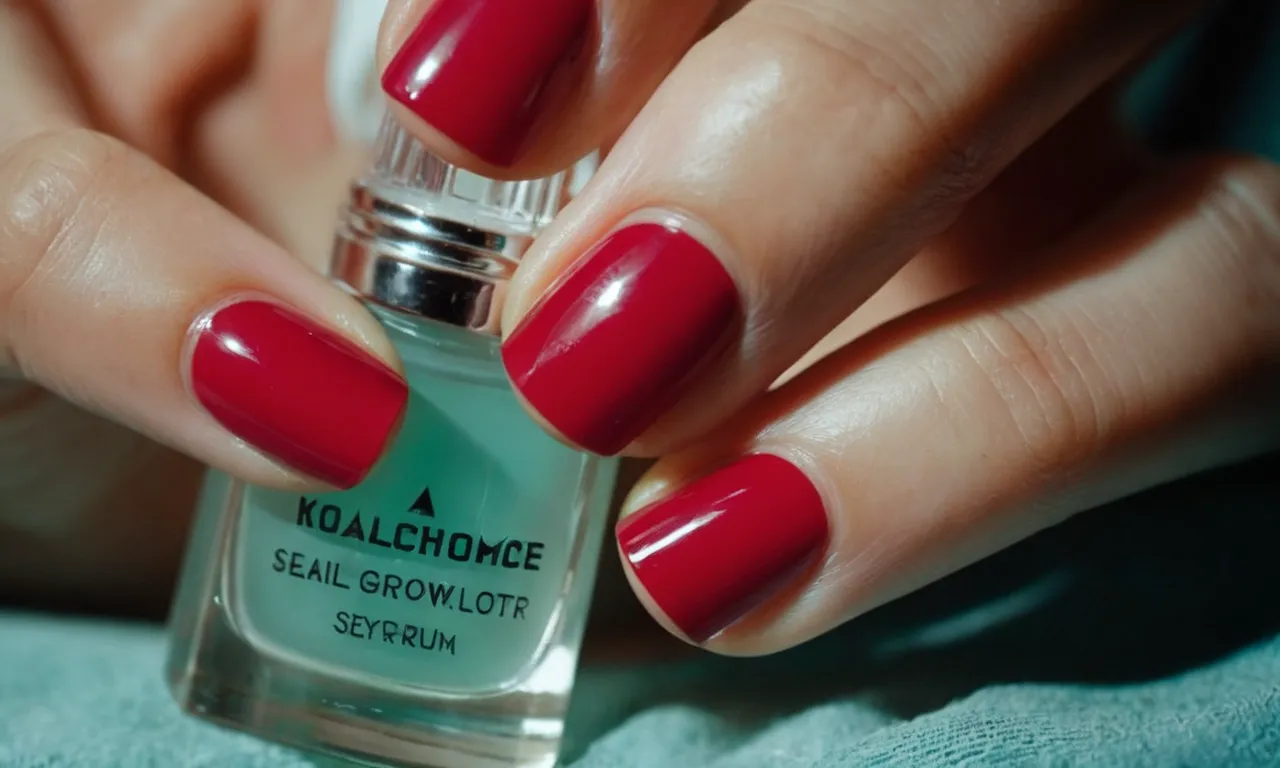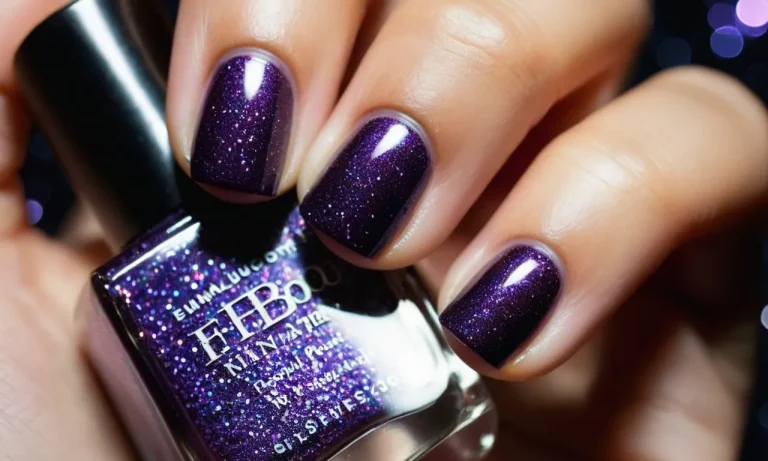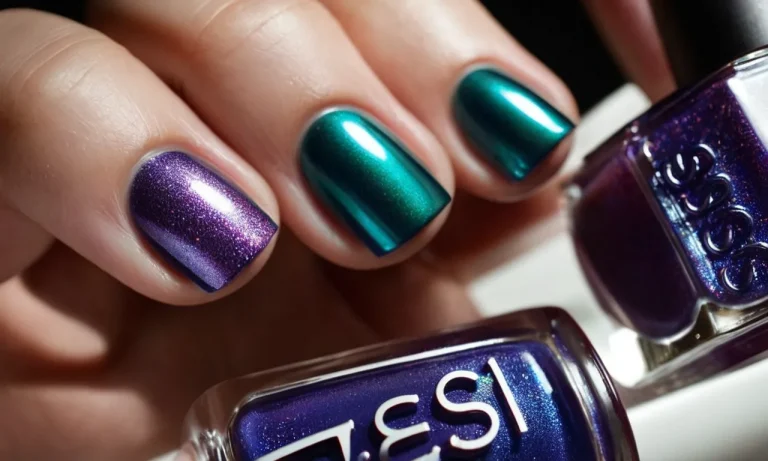How To Grow Bitten Nails Faster: A Comprehensive Guide
If you’re a nail biter struggling to grow your nails, you’re not alone. Many people find themselves chomping down on their nails when they’re bored, stressed, or have anxiety. The good news is there are steps you can take to help your nails grow faster after biting them.
If you’re short on time, here’s a quick answer to your question: Applying nail hardeners, taking biotin supplements, using cuticle oil, and getting acrylic nails applied can all help strengthen nails and stimulate faster growth after biting them.
In this comprehensive guide, we’ll cover why nails may grow slowly after biting, how biting affects nail growth, and actionable tips you can start applying today to get your nails growing faster and healthier again.
Why Do Bitten Nails Grow Slowly?
Nail biting can significantly slow nail growth for a variety of reasons. When you bite your nails, you cause damage to the sensitive nail bed underneath, which is responsible for nail growth. You also expose the nails to moisture loss and interrupt nutrient supply, both of which are essential for quick nail regeneration.
Damage to the Nail Bed
The nail bed contains blood vessels, nerves, and specialized nail matrix cells that stimulate nail growth. When you bite your nails, you create wounds, inflammation, and possibly infections in the nail bed. This impairs the matrix cells’ capacity to multiply and form new nail layers.
Moreover, inflammation and scar tissue may physically hinder the emerging nail plate. The more you bite your nails, the more accumulated damage occurs to the nail beds over time. Studies show up to 30% slower nail growth in chronic nail biters versus non-biters.
Loss of Moisture and Nutrients
Healthy, fast-growing nails require adequate hydration and nutrients. The eponychium (cuticle) protects moisture and oils around the nails. Biting strips away this protective barrier, causing moisture evaporation and brittle nails.
Additionally, you lose essential minerals and vitamins like calcium, zinc, biotin, and folic acid when you bite off nails. Deficiencies in these compounds can negatively impact nail regeneration.
Using a nourishing nail and cuticle oil like Amazon’s Best Sellers can help restore moisture and nutrients to counter biting-related deficiencies. Take oral supplements if your diet lacks these nail-healthy compounds.
| Nail Growth Rate | With Nail Biting | Without Nail Biting |
| Fingernails | 2-5 mm/month | 5-10 mm/month |
| Toenails | 1-2 mm/month | 3-5 mm/month |
As the table shows, nail growth can be 50-60% slower in people with nail biting habits compared to others. The good news is that nails often return to normal growth rates after stopping nail biting, though it may take months for full regeneration.
How Biting Affects Nail Growth
Nail biting can significantly impact the rate and quality of nail growth. This bad habit inhibits keratin production and exposes nails to harmful bacteria, leading to various nail conditions.
Inhibits Keratin Production
Keratin is a key protein that makes up the nail plate. Biting strips away layers of keratin, forcing the nail to regrow the lost keratin. This diverts energy and resources away from growing the nail forward. As a result, nail growth slows down substantially after biting episodes.
In severe cases, frequent biting inhibits matrix cells in the nail root from producing adequate keratin. This causes nails to become thin, soft, brittle and even distorted in shape.
Exposes Nails to Bacteria
Our mouths contain over 700 types of bacteria. These microbes are transferred to nail beds when biting occurs. Such bacterial invasion increases risks of fungal and microbial nail infections like:
- Green nails
- Paronychia (inflammation of nail folds)
- Onycholysis (separation of nail from nail bed)
Infected nails appear discolored and crumbly. As the infection progresses untreated, nails can become warped, detached completely from the nail bed, or fall off. This leads to great discomfort and embarrassment.
A research study discovered that 57% of nail biters had nail infections, compared to only 16% among non-biters.[1] This shows the tremendously higher risks nail biters face.
Therefore, to achieve healthy growing nails, it’s imperative to kick the nail biting habit and practice good nail hygiene.
Tips to Grow Bitten Nails Faster
Apply a Nail Hardener
One of the best ways to help grow out bitten nails faster is to apply a nail hardener. These products work by depositing extra layers of keratin to the nail plate, making nails stronger and less prone to peeling or breaking (1).
Popular nail hardeners like OPI Nail Envy or Duri Rejuvacote can be painted on nails 1-2 times per day. Make sure to prep nails first by removing any oils and buffing the surface lightly. The nail hardener should be applied in thin coats, allowing each layer to dry completely before adding the next.
In just a few weeks, you may notice longer, stronger nails that resist the urge to bite. Awesome!
Take Biotin Supplements
Biotin is a B complex vitamin that supports healthy hair, skin, and nails. Studies show that taking biotin supplements can help enhance nail growth and thickness (2). Aim for 2.5-5 mg of biotin per day, an amount found in many hair, skin, and nail supplements.
High biotin foods like eggs, salmon, avocados and nuts are also great additions. After 3-6 months of consistent use, you’ll likely see an improvement in nail growth and strength. Biotin is safe for most people but check with your doctor before starting any new supplement, especially if you take medication.
Use Cuticle Oil
Keeping cuticles moisturized can help minimize nail biting and picking. Look for a nail oil containing nourishing ingredients like vitamin E, jojoba oil or glycerin. Apply a few drops of oil around each nail 1-2 times per day, gently massaging into the nail and cuticles.
This helps soften cuticles so they are less tempting to bite or pick at. Plus, the soothing massage can make you more mindful, relaxing both the body and mind. Cuticle oil can also be used after a nail treatment for added moisture. Beautiful, healthy cuticles mean no need to bite!
Get Acrylic or Gel Nail Enhancements
If you chronically bite your nails, getting professional acrylics or gel manicures can provide a physical barrier to stop biting. Most salon services like SNS dip powder nails or Shellac gel polish are designed to be very hard, making it difficult to penetrate the enhancement with teeth.
Having polish or artificial nails applied every 2-3 weeks prevents you from biting your natural nails, allowing them to grow out long and strong underneath. This method trains you to stop the nail biting habit. Once your natural nails are the desired length, you can have the enhancements removed.
Just be patient maintaining the manicures until your natural nails grow out fully. You’ve got this!
Establish a Nail Care Routine
Keep Nails Trimmed
Keeping your nails trimmed short is crucial for allowing them to grow out and recover from biting or picking. Use nail clippers or nail scissors to trim your nails once a week. Trim them straight across and smooth any rough edges with a nail file.
The shorter your nails are, the less tempting it will be to bite or pick at them. Aim to keep your nails trimmed to a length that sits just above the tips of your fingers.
Moisturize Cuticles
Dry, cracked cuticles can tempt you to pick at them, making it harder for your nails to grow. Applying cuticle oil or cream 2-3 times per day keeps your cuticles soft and conditioned. Gently push back cuticles after bathing when they are soaked. Resist the urge to bite or tear at hangnails.
Instead, clip them carefully with nail scissors or clippers. Well-moisturized cuticles help your nails grow longer and stronger.
Avoid Picking and Biting
Kicking the habit of nail biting or picking can be challenging, but it is essential for growing out your nails. Identify when and why you tend to bite or pick. Is it out of boredom? Anxiety? Or a subconscious habit?
Find alternatives like squeezing a stress ball or taking deep breaths when you get the urge. Try using a bitter-tasting polish or bandages to prevent biting. Keep a file handy to smooth rough edges instead of picking at them.
It may take consistency and commitment to fully stop biting or picking, but it makes a huge difference in growing your nails.
When to See a Doctor
Persistent Infections
If you notice persistent redness, swelling, oozing, or pain around your nail beds, this likely indicates an infection that requires medical attention. Infections can occur when hangnails are picked open or when the delicate nail bed tissue becomes damaged, allowing bacteria an entry point under the nail.
Left untreated, the infection can spread to the nail matrix and cuticle, sometimes requiring surgical drainage or nail removal. See your doctor right away if you experience these persistent infection symptoms for more than 2-3 days without improvement.
Extreme Brittleness or Crumbling
Healthy fingernails should not crumble easily or have extreme brittleness. If your nails become paper-thin and fragment into pieces with normal use of your hands, see your doctor. This extreme brittleness can indicate an underlying health condition, such as thyroid disorders, anemia, malnutrition, vitamin deficiency, or side effects of certain medications.
Blood tests can help diagnose many of these internal issues. Your doctor may prescribe supplements or adjust medications to help restore strength and resilience to your nails.
Discolored Nails
While bruised nails or small splinter hemorrhages under nails can occur with minor nail bed trauma, significant or persistent nail discoloration warrants medical evaluation. Dark black-brown streaks or dots under nails when you have not injured them could indicate melanoma.
Nail fungus infection is another common cause of yellow-brown nail discoloration and crumbling. The earlier it is treated, the less damage it causes. See your doctor if you notice any unusual nail color changes or marks of unknown origin.
A simple scraping of the nail can be examined under a microscope to diagnose fungal infections, while melanoma may require imaging tests or biopsy for confirmation.
Don’t wait with concerning nail issues that persist despite home treatment. Seeing your doctor promptly for injuries, infections, or abnormalities affecting nail growth can help restore health and prevent future complications.
Learn more about common nail problems on authoritative medical sites like Mayo Clinic at https://www.mayoclinic.org/healthy-lifestyle/adult-health/multimedia/nails/sls-20076131.
Conclusion
Growing out bitten nails can feel like an uphill battle, but having patience and diligently caring for your nails and cuticles can pay off. With time, your nails will lengthen and strengthen.
Establish a routine using nail treatments and moisturizers while also addressing any underlying causes of your nail biting habit. With consistency, you can undo damage caused by biting and get your nails looking healthy again.
Don’t get discouraged if progress seems slow at first. Any little bit of growth is still progress. Stay diligent with your nail care regimen and remember to celebrate small wins and milestones along the way.







